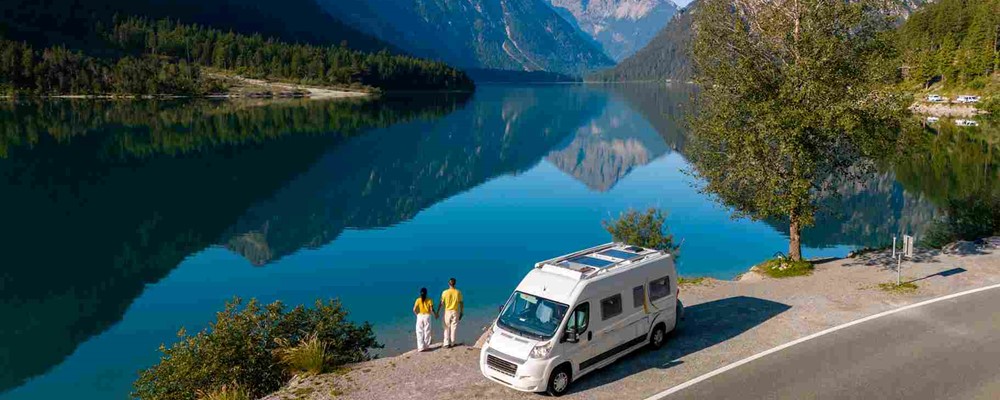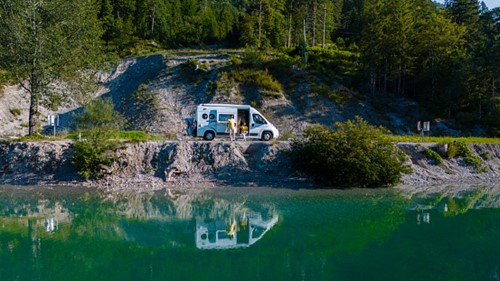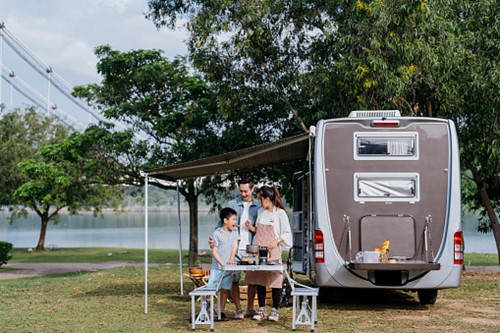What is a caravanette?


The word ‘caravanette’ isn’t one you hear often, so you might not understand what this term means should you come across it in a discussion, a publication, or an online forum.
In this guide, we’ll detail what a caravanette is, how it differs from a caravan, and why this term isn’t typically used anymore.
Caravanette: A description
A caravanette is a small, self-contained motorhome designed for road trips and short stays, typically sleeping two to four people. The word ‘caravanette’ is essentially another word for a campervan and is sometimes used by older enthusiasts and those who enjoy a little nostalgia.
From the 1950s through to the 1980s, ‘caravanette’ was a popular term in the UK. It was used by manufacturers, insurance companies, and the DVLA to describe small, van-based campers. These were smaller than full-size motorhomes but offered more freedom and convenience than towing a caravan.
Caravanette vs caravan: The key differences

While they both provide mobile accommodation, the differences between caravanettes and caravans are apparent:
1. How they move
A caravanette has its own engine and can be driven like a car or van, so you don’t need to tow it or use a separate vehicle. A caravan has no engine, must be towed, and is essentially a trailer with living accommodation.
2. Ease of travel
Caravanettes generally offer a more streamlined travel experience as you start the engine and hit the road. With a caravan, you need to hitch up, check the towbar, lights, and weight limits, and then carefully reverse or manoeuvre. For short trips or weekend getaways, a caravanette is often more convenient than a caravan.
3. Space and comfort
As caravans are not limited by the size of a van chassis, they tend to offer more space and luxury, including larger bathrooms, proper beds, and bigger kitchens. In comparison, caravanettes are very compact. They might have a small hob and sink, a fold-out bed, and clever storage solutions, but space is often limited.
4. Parking and access
A caravanette can park in most car parks, small campsites, and on the road. You can even use it for day trips, commuting, or shopping. A caravan, once detached, remains on a site, and you need a separate towing vehicle to move it anywhere. This flexibility is one of the caravanette’s most significant advantages. It’s ideal for people who enjoy frequent travel, prefer to travel light, or explore multiple destinations during a single trip.
5. Maintenance and licensing
A caravanette is a motor vehicle, which means it needs an MOT, road tax, and insurance just like any other van or car. Caravans don’t require an MOT, although they must still be roadworthy and insured for towing.
Why isn’t the word ‘caravanette’ really used anymore?

Over time, the word ‘caravanette’ fell out of everyday use, and the term was replaced by ‘campervan’ for smaller, van-based leisure vehicles and ‘motorhome’ for larger vehicles with more spacious interiors.
In official paperwork, such as DVLA registration documents, the body type ‘caravanette’ used to appear occasionally. Today, DVLA uses the term ‘motor caravan’ or ‘motorhome’ instead.
Can you still buy caravanettes?
Roads and campsites are filled with a variety of vehicles offering accommodation facilities, ranging from tiny micro-campers built on small cars to luxury motorhomes the size of buses. While small campers are no longer marketed as caravanettes, there are certainly some options that fit the description, such as the VW California, which offers a modern take on the compact campervan.
The concept of a caravanette has come full circle since the 1960s, when they were a practical, affordable alternative to towing a caravan. These days, the van-life trend has people looking for the exact same simplicity, freedom, and independence that original caravanettes offered decades ago.
Specialist motorhome and campervan insurance through Ripe
Whether you have a motorhome or a caravan, you can purchase specialist insurance through Ripe. Hit the road with confidence knowing you’re covered should the unexpected happen.
Get an instant online quote today.
Please note the information provided on this page should not be taken as advice and has been written as a matter of opinion. For more on insurance cover and policy wording, see our homepage.
Please enter a valid email address.
Please Please tick one of the boxes below.
The latest news – direct to your inbox.
Subscribe for all the latest news, tips and offers from the Ripe Group. You can unsubscribe at any time. For information on how we use your data, please see our Privacy policy.
Thank you for subscribing, you’ll be hearing from us soon!


